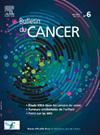Cartographie française des activités de pharmacie clinique réalisées auprès des patients âgés atteints de cancer : une enquête SFPO-SFPC
IF 1.1
4区 医学
Q4 ONCOLOGY
引用次数: 0
Abstract
Introduction
Les patients âgés atteints de cancer sont particulièrement vulnérables face au risque iatrogène médicamenteux et l’implication du pharmacien dans leur prise en charge multidisciplinaire est nécessaire tout au long du parcours de soins. Cette étude vise à réaliser un état des lieux du déploiement en France des activités de pharmacie clinique intégrées à la prise en charge multidisciplinaire en oncogériatrie.
Méthode
Une enquête en ligne auprès des pharmaciens des sociétés savantes françaises de pharmacie clinique (SFPC) et oncologique (SFPO) a été réalisée entre le 1er mai 2023 et le 31 août 2023. Le questionnaire portait sur la description des activités de pharmacie clinique associées aux activités pluridisciplinaires en oncogériatrie développées dans l’établissement. Une réponse unique par structure était demandée.
Résultats
Sur 70 répondants, 65,7 % proposent une activité d’évaluation oncogériatrique multidisciplinaire. Des activités de pharmacie clinique y étaient associées dans 38,6 % des établissements et en projet dans 14,2 %. Elles sont réalisées en parallèle de l’activité médicale, majoritairement au décours de l’initiation du traitement anticancéreux et en ambulatoire. Elles comportent notamment la conciliation médicamenteuse et l’optimisation du traitement. Les principaux freins à leur développement sont le manque de ressources humaines et financières, notamment dans le cadre d’une hospitalisation complète.
Discussion/Conclusion
Les pharmaciens restent encore trop peu intégrés aux équipes multidisciplinaires en oncogériatrie, malgré leur rôle crucial dans le parcours de soins et l’impulsion donnée par les sociétés savantes. L’évolution des modes de financement et le développement de la coopération ville–hôpital pourrait permettre à l’avenir de favoriser cette intégration.
Introduction
Older patients with cancer are particularly vulnerable to the risk of adverse drug events. Therefore, it is essential that pharmacists play an active role in their multidisciplinary management throughout the care pathway. The aim of this study is to provide an overview of clinical pharmacy activities integrated into multidisciplinary management in geriatric oncology in France.
Method
An online survey involving pharmacists from the French societies of clinical pharmacy (SFPC) and oncology pharmacy (SFPO) was carried out between 1st May 2023 and 31 August 2023. The questionnaire focused on the description of clinical pharmacy activities associated with multidisciplinary geriatric oncology assessment developed in the institution. A single response per hospital was required.
Results
Among the 70 respondents, 46 (65.7%) offer multidisciplinary geriatric oncology assessments. Clinical pharmacy activities have already been integrated to these assessments in 27 (38.6%) hospitals, and a further 10 (14.2%) are planning to implement them in the near future. These activities are carried out in parallel with medical activities, primarily after the initiation of cancer treatment and mainly on an outpatient basis. They mostly involve medication reconciliation and optimization of drug therapy. The main obstacles to their development are the lack of human resources and funding, particularly in hospitalization settings.
Discussion/Conclusion
Pharmacists are still insufficiently integrated into multidisciplinary geriatric oncology teams, despite their crucial role in the care pathway and the advocacy of professional societies. Changes in funding methods and the development of digital tools for city–hospital cooperation could help to promote this integration in the future.
[老年癌症患者临床药学活动的法语制图:SFPO-SFPC调查]。
介绍:老年癌症患者特别容易受到药物不良事件风险的影响。因此,在整个治疗过程中,药剂师必须在多学科管理中发挥积极作用。本研究旨在概述法国将临床药学活动纳入老年肿瘤多学科管理的情况:方法:2023 年 5 月 1 日至 2023 年 8 月 31 日,法国临床药学协会(SFPC)和肿瘤药学协会(SFPO)的药剂师参与了一项在线调查。调查问卷的重点是描述与医院内开展的多学科老年肿瘤评估相关的临床药学活动。每家医院只需回答一次:在 70 位受访者中,有 46 家(65.7%)提供多学科老年肿瘤评估。27家医院(38.6%)已将临床药学活动纳入这些评估,另有10家医院(14.2%)计划在不久的将来实施这些活动。这些活动与医疗活动同时进行,主要是在癌症治疗开始后,而且主要是在门诊进行。这些活动主要涉及药物调节和优化药物治疗。其发展的主要障碍是缺乏人力资源和资金,尤其是在住院环境中:讨论/结论:尽管药剂师在治疗过程中发挥着重要作用,专业协会也大力提倡,但多学科老年肿瘤团队对药剂师的整合仍然不足。改变资助方式和开发城市-医院合作的数字化工具有助于在未来促进这种整合。
本文章由计算机程序翻译,如有差异,请以英文原文为准。
求助全文
约1分钟内获得全文
求助全文
来源期刊

Bulletin Du Cancer
医学-肿瘤学
CiteScore
1.90
自引率
16.70%
发文量
224
审稿时长
37 days
期刊介绍:
Without doubt, the ''Bulletin du Cancer'' is the French language publication of reference in the field of cancerology. Official organ of the French Society of Cancer, this journal covers all the information available, whether in the form of original articles or review articles, but also clinical cases and letters to the editor, including various disciplines as onco-hematology, solids tumors, medical oncology, pharmacology, epidemiology, biology as well as fundamental research in cancerology. The journal proposes a clinical and therapeutic approach of high scientific standard and regular updates in knowledge are thus made possible. Articles can be submitted in French or English.
 求助内容:
求助内容: 应助结果提醒方式:
应助结果提醒方式:


